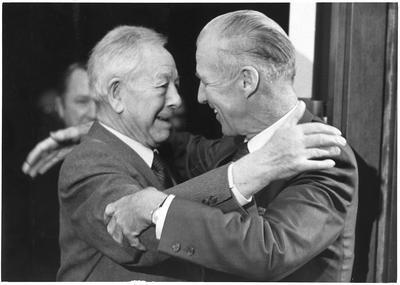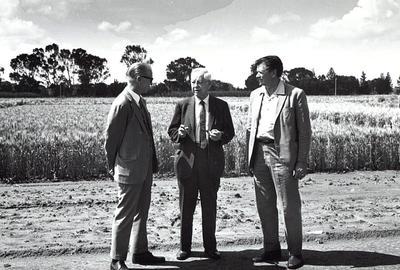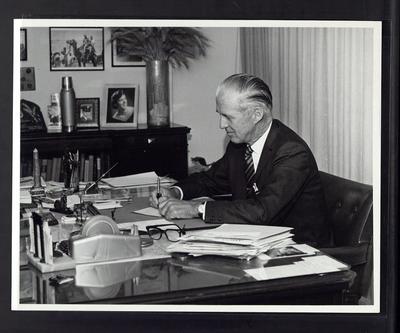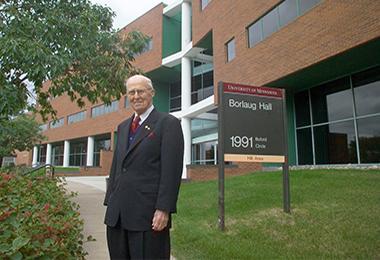The 1970 Nobel Peace Prize

1970 - Norman is thrust onto the world stage when the Nobel Peace Prize Committee selects him to represent the “Green Revolution”. To them the Green Revolution fostered peace by helping millions escape famine and misery. It averted massive social and political upheaval, and brought prosperity to areas of the world heretofore considered hopeless. Norman is grateful but believes that either Elvin Stakman or J. George Harrar should have gotten or perhaps shared the the prize and sends both letters stating so.
Professor John Sannes of the Nobel Committee addresses the reason why they chose Norman: “We did not award the Peace Prize to the scientist Dr. Borlaug. We awarded it to the man Dr. Borlaug, of whom the scientist is just one well-integrated part—from the day you crossed the border to North Mexico you as a man have put yourself as a scientist at the disposal of suffering humanity. You have made the fight against hunger your lifelong mission, your passionate calling, to which you have devoted your brains, the brains of a first rate scientist, your hands, the hands of the Iowa farmer, and your open, broad warm heart…”
In Norman’s 1970 Peace Prize acceptance speech he addresses both the achievements of the many participants in the Green Revolution and also warns of too much population growth. Read more details on Borlaug’s accomplishments with the Green Revolution here.
Borlaug, Stakman and Anderson

The Nobel Peace Prize is life changing and in Norman’s own words: “The Nobel Prize hit me like a typhoon”. Now, however, Norman E. Borlaug now becomes a citizen of the world. He is a counselor to many, and is in constant demand. He will guide many world leaders and countries as they adopt the educational and technical advances needed for their own Green Revolutions; through it all Norman remains unchanged. He is as at home speaking with impoverished farmers or with world leaders. His University of Minnesota mentor, Elvin Stakman, is delighted by Norman’s success.
In 1971 Norman, due to the demands that go with the Nobel Peace Prize, can not spend as much time as he wishes with CIMMYT, to help him his friend Dr. R. Glenn Anderson becomes the Deputy Director of CIMMYT’s Wheat Program. In 1979 Norman will officially retire from CIMMYT and Glenn Anderson will become its Director.
Belated Recognition in the United States
1977 - Influential people in the United States of America finally realize what Norman represents to humanity; he receives the "Presidential Medal of Freedom". This honor is awarded "for especially meritorious contribution to (1) the security or national interests of the United States, or (2) world peace, or (3) cultural or other significant public or private endeavors"
Great Mentors and an Esteemed Colleague Pass Away
1979 - Norman’s teacher, mentor and great friend Professor Elvin C. Stakman of the University of Minnesota passes away.
Norman Answers Critics

Beginning in the 1980s, environmental groups opposed to the Green Revolution pressure the Rockefeller and Ford Foundations, and the World Bank to cease funding African agriculture projects. European governments stop supplying inorganic fertilizer to Africa. Norman considers this particular aspect of the environmental movement radical and naive. He goes on record as saying - "some of the environmental lobbyists of the Western nations are the salt of the earth, but many of them are elitists. They've never experienced the physical sensation of hunger. They do their lobbying from comfortable office suites in Washington or Brussels. If they lived just one month amid the misery of the developing world, as I have for fifty years, they'd be crying out for tractors and fertilizer and irrigation canals and be outraged that fashionable elitists back home were trying to deny them these things".
1981 - Under tragic circumstances Glenn Anderson suddenly dies and Norman comes out of retirement as interim Director General for CIMMYT for a year.
1982 - Norman’s fellow Minnesota alum and mentor, Dr. Jacob George “Dutch” Harrar passes away. Harrar led the Rockefeller Foundation’s “Mexican Project” and then became President of the Foundation. Harrar really liked and admired Norman but was often frustrated with Norman’s disregard for budgets, unilateral actions and belated skimpy reporting.
Texas A&M University-Famine in Africa
1984 - Norman accepts a Distinguished Professorship of International Agriculture at Texas A&M University. Norman will have a long association with Texas A&M. He also has smaller obligations to other universities and ties with other entities.
A great famine in Ethiopia prompts Japanese philanthropist/businessman Ryoichi Sasakawa to approach Norman to help Africa. Thus, the "Sasakawa Africa Association” is founded. Norman will become its president and later SAA joins with “The Carter Center” (begun by former U.S. President Jimmy Carter) in an initiative called the “Sasakawa-Global 2000”, SAS focuses on food, population and agriculture policy for African nations. Norman will work with and guide SAA for the remainder of this life.
Borlaug at the University of Minnesota

1985 - The University of Minnesota opens Borlaug Hall, a 100,000 square ft building that houses the departments of Plant Pathology, Agronomy and Plant Genetics and Soil Science.
Minnesota Roots-Reconnecting with Wrestling at the University
1986 - Norman goes to the athletic facilities on the Minneapolis campus and to the wrestling room where the new coach J Robinson sees him. Norm says that he wrestled for the Gophers in the 1930’s. Robinson has no idea who Norman Borlaug is, but he immediately likes him. They have a long conversation about wrestling. Only later will Robinson learn of Norman’s fame. The two of them become close friends for the rest of Norman’s life. They often discuss wrestling, a topic Norman really enjoys. Robinson considered himself very privileged to spend a day with Norman shortly before his death
Iowa Roots-The World Food Prize
Soon after his Nobel Peace Prize award Norman approached the Nobel Foundation and inquired about a Nobel Prize for food production or agricultural advances. They responded sympathetically, however, there is no provision in Alfred B. Nobel’s will to endow such a prize; it was legally impossible. Norman ponders this lack of recognition for ‘hunger fighters’.
1986 - With support from corporate sources, Norman Borlaug establishes the World Food Prize. It honors those who make significant and measurable contributions to improving the world's food supply. In 1990 the businessman/philanthropist John Ruan endows the World Food Prize and permanently locates it in Des Moines, Iowa. Norman’s vision will continue in perpetuity. The World Food Prize will be Norman’s great legacy. The first prize awarded in 1987, goes to Norman's former colleague in India, M.S. Swaminathan. Swaminathan uses the US$250,000 prize to initiate the MS Swaminathan Research Foundation for sustainable development.